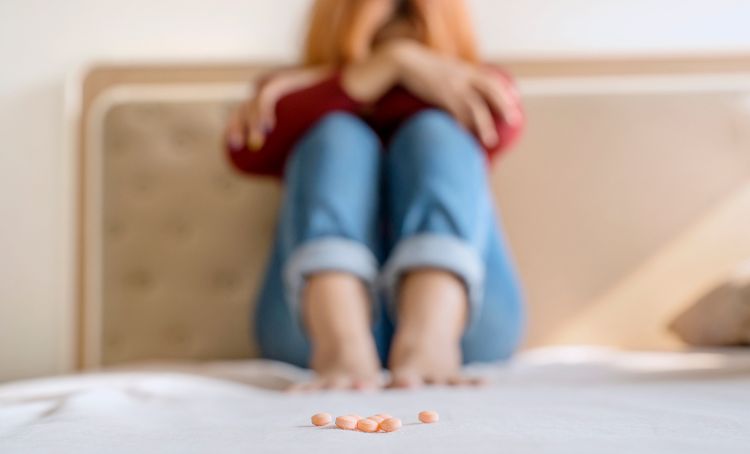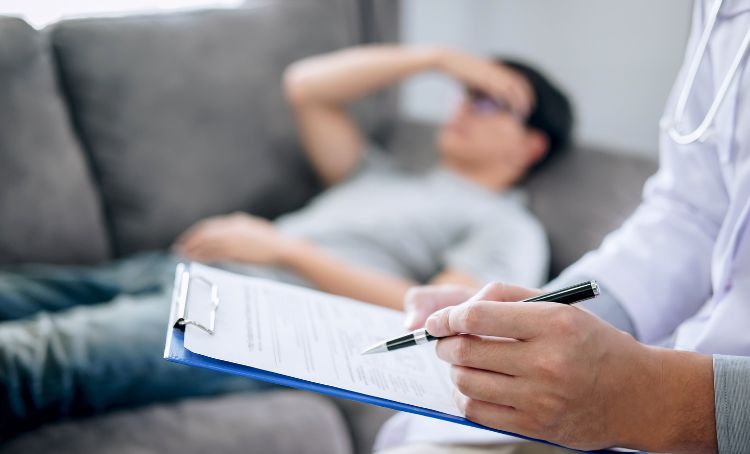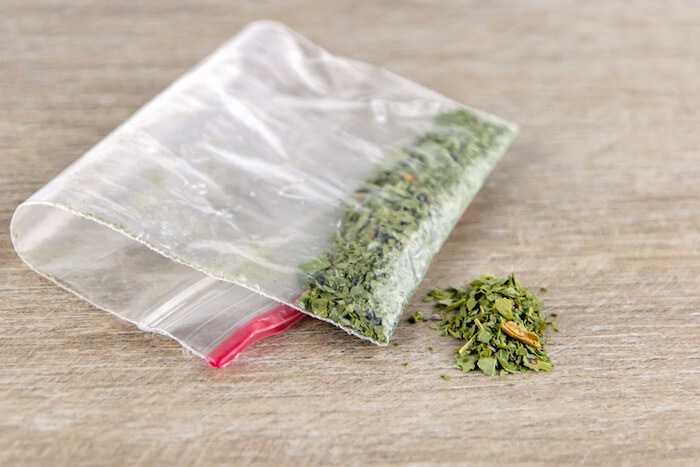Updated October 2024
Pregabalin withdrawal symptoms can be crippling.
Struggling with pregabalin addiction? You’re not alone. In today’s post, we explain the issues of abuse, addiction, and the challenging Pregabalin withdrawal symptoms that can accompany it. Whether you or someone you know is facing these issues, we hope this post has some key insights and guidance that will help.
What Is Pregabalin?

Pregabalin, commonly recognised by its brand name Lyrica, is a prescription medication with a history dating back to 2004. Initially approved for treating diabetic neuropathy and epilepsy-associated seizures, it has gained notoriety for its misuse and recreational use.
Today, you could be prescribed doses of Pregabalin (or Lyrica) for a range of conditions, such as epilepsy,anxiety and for blocking pain signals from nerves.
How Does Pregabalin Work?
Pregabalin is a gamma-aminobutyric acid (GABA) analog that binds to the alpha 2 –delta site of voltage-gated calcium channels within the central nervous system.
By modulating calcium influx in nerve terminals, pregabalin inhibits the release of various excitatory neurotransmitters, such as glutamate, serotonin, substance P, and calcitonin gene-related peptide.
This mechanism of action allows pregabalin to function as an inhibitory neurotransmitter in the brain, making it effective for treating conditions like neuropathic pain, fibromyalgia, and anxiety disorders.
Why is Pregabalin Used Recreationally?
A high dose of pregabalin is popular recreationally for the relaxing and euphoric effects it produces and to enhance the effect of alcohol and drugs such as opioids. Particular attention has been focused on the combination of pregabalin with other drugs, as it substantially heightens the risk of abuse and addiction.
This has prompted official alerts regarding the risk of addiction to pregabalin from authoritative bodies like the United States Drug Enforcement Agency (DEA) and the UK government. Both have issued warnings about how pregabalin has the potential to be abused, especially when combined with other substances, including Xanax, Ativan, and Valium. Research also indicates that taking pregabalin with other opiates can increase the risk of fatality,
Pregabalin misuse is a genuine concern, and if you use pregabalin as a prescribed medication or recreationally, the development of pregabalin addiction is a possibility that cannot be underestimated. This progression can occur with alarming speed, and the risk of pregabalin addiction can be as serious as addiction risks to substances like cocaine.
Why is Pregabalin Addictive?

Pregabalin dependence is a complex condition that alters the structure and function of the brain. It affects various brain regions and neurotransmitter systems, leading to profound changes in behaviour and decision-making.
When the intake of pregabalin is increased over an extended period, the brain continues to undergo changes that make it more challenging to have any control, this is what is classed as an addiction to pregabalin.
This is further compounded by pregabalin withdrawal symptoms, which can be distressing and difficult to cope with, driving individuals to take it just to feel “normal”.
Here are some of the other ways addiction transforms the brain:
Structural Changes to the Brain
Chronic drug use can lead to structural alterations in the brain. For example, studies have shown that long-term pregabalin abuse can shrink the prefrontal cortex and enlarge the amygdala, which is involved in emotional responses. These structural changes can persist even when the drugs are no longer being taken.
Reward Pathway Alteration
Addiction primarily impacts the brain’s reward pathway. When an individual engages in addictive behaviour, such as taking drugs or alcohol, the brain releases a surge of dopamine, a neurotransmitter associated with pleasure and reward.
Over time, the brain adapts to this artificial reward by reducing its sensitivity to dopamine, leading to a diminished sense of pleasure from everyday activities.
Messed-Up Brain Chemistry
Prolonged substance abuse disrupts the balance of brain chemistry, including the release of dopamine, serotonin, and glutamate. This dysregulation contributes to cravings, mood disturbances, and poor decision-making.
Bad Choices
Addiction affects the part of the brain that helps us make good choices. Over time, the prefrontal cortex, responsible for rational thinking, judgement, and impulse control, becomes impaired.
As a result, individuals with addiction often prioritise drug use over other essential aspects of life and will do things they normally wouldn’t do.
Tolerance and Withdrawal
Repeated drug exposure leads to tolerance, where higher doses are required to achieve the same effect. At the same time, the brain adapts to the presence of the drug, leading to withdrawal symptoms when the substance is not consumed. These processes further reinforce addictive behaviour.
Triggers
Environmental cues associated with drug use can trigger intense cravings, even in individuals in recovery. These cues activate the brain’s reward circuitry and can make it difficult for individuals to maintain abstinence.
Side Effects of Pregabalin
Whether pregabalin is taken as prescribed or used recreationally, it is essential to be aware of potential side effects that may arise. If you have concerns about the dose of pregabalin you take and addiction or experience any adverse effects, you can contact your GP or local NHS addiction treatment centre for guidance and support.
Common side effects associated with pregabalin fall into three categories:
- Behavioural & Psychological
- Physical
- Severe
Behavioural and Psychological Symptoms
There are a wide range of ways pregabalin addiction can manifest. Sometimes the most obvious are the behavioural symptoms. These are most problematic when combined with existing psychiatric disorders.
Some of the most common behavioural side effects of Pregabalin addiction include social isolation, impulsivity, irritability, panic attacks, agitation, and hostility.
Individuals may also exhibit withdrawn behavior when around others, exaggerate medical symptoms to obtain more Pregabalin, experience financial difficulties as a result of funding their habit, and obsess over obtaining more of the drug.
Mood swings, anxiety, and the inability to stop using despite negative consequences are also typical behavioural symptoms of Pregabalin addiction.
Pregabalin is known to produce a sense of euphoria in some users, which can be one of the factors contributing to its recreational use.
Physical Side Effects of Pregabalin Addiction
Some of the most common physical side effects of Pregabalin addiction include an increased or irregular heart rate and palpitations, high fever, depression, anxiety, impaired memory, difficulty speaking, lack of coordination, dizziness, and more serious complications such as neurologic and physical symptoms.
When Pregabalin is abused or taken in excessive amounts, it can lead to a range of physical health problems that can significantly impact an individual’s overall well-being. It’s important to be aware of these potential physical side effects and seek help if you or someone you know is struggling with Pregabalin addiction.
Severe Side Effects of Pregabalin Addiction
As with many substance use disorders, a range of physical health symptoms can show when a physical dependence to Pregabalin is established. Some of the most common side effects of pregabalin addiction include:
Muscle Spasms:
Unexplained muscle spasms or contractions should not be ignored and should be discussed with a healthcare provider.
Seizures:
Pregabalin withdrawal or misuse can sometimes trigger seizures, a condition that demands immediate medical intervention.
Breathing Problems or Shallow Breathing:
Any difficulty in breathing or shallow breathing patterns should be addressed urgently.
Racing Heartbeat (Heart Palpitations):
If you experience rapid or irregular heartbeats, also known as heart palpitations, it is crucial to receive a medical evaluation to rule out any cardiac issues.
Suicidal Thoughts:
The emergence of suicidal ideation or changes in mood while using pregabalin is a grave concern. Please seek immediate help and support from a healthcare professional if you or someone you know is experiencing such thoughts.
Pregabalin, whether for medical purposes or recreationally, carries the potential for various side effects, some of which can be serious. Monitoring for these effects and seeking medical attention when necessary is vital to reduce the risk of fatality.
These symptoms can be debilitating and may worsen over time with continued misuse of pregabalin. It is crucial for individuals struggling with pregabalin addiction to seek help and support to address these health concerns and work towards recovery.
Pregabalin and Alcohol Use

Like some other prescription drugs, combining alcohol and pregabalin can have dangerous consequences on your physical and mental health. Both substances affect the central nervous system, and when taken together, their effects can be intensified and unpredictable. Here are several reasons why you should avoid mixing alcohol and pregabalin:
Increased Risk of Overdose: Alcohol and pregabalin are both depressants, and when consumed together, they can lead to a heightened risk of overdose. This can result in severe respiratory depression, loss of consciousness, and even death.
Impaired Cognitive Function: Both alcohol and pregabalin can impair your cognitive abilities, such as memory, concentration, and judgement. Combining them can impair your judgement, increasing the chance of having an accident and leading to risky behaviours that may have legal consequences.
Mood and Mental Health Effects: Pregabalin is often prescribed for conditions like anxiety and neuropathic pain. However, mixing it with alcohol can exacerbate mood swings, increase anxiety, and even lead to depressive disorder symptoms.
Physical Health Risks: The combination of alcohol and pregabalin can put significant stress on your liver and other vital organs, potentially leading to long-term health problems.
Risk of Addiction: Both substances have a potential for addiction individually. When taken together, they can reinforce each other’s addictive qualities, making it more challenging to quit.
At Step by Step Recovery, we offer free, no-pressure advice and support. We provide addiction treatment in London and at our residential rehab in Essex . Call 0800 170 1222 to speak with our compassionate team or fill out our simple online assessment form.
Pregabalin Withdrawal Symptoms
The experience of abrupt discontinuation of a prescribed dose of pregabalin will vary from person to person. While some individuals may find this process relatively straightforward, others may encounter severe withdrawal symptoms, which can be extremely unpleasant. This is particularly difficult for those who have build a physical dependence to the drug
If you currently rely on pregabalin as part of your prescribed treatment, the first thing to do is to engage in an open and honest conversation with your GP or healthcare provider before considering any changes to your medication. The decision to discontinue pregabalin should only ever be made with professional support.
Attempting to do so independently can lead to uncontrolled and uncomfortable withdrawal symptoms. Let’s explore some of these now.
Physical Withdrawal Symptoms
Acute pregabalin withdrawal can lead to a range of physical symptoms, including gastrointestinal issues like nausea, vomiting, and diarrhoea, and fluctuations in body temperature, characterised by sweating and chills.
Muscle and joint discomfort may also accompany this transitional phase.
For those with a history of epilepsy, heightened caution is advised, as the risk of seizures during this phase may increase. Attempting to stop using pregabalin and other addictive substances without support from addiction treatment professionals is not recommended.
Phycological Withdrawal Symptoms
Discontinuation of pregabalin can lead some individuals to find themselves contending with anxiety and depression, while others may grapple with sleep disturbances, such as insomnia.
It is essential to pay attention to withdrawal symptoms, particularly during the initial stages of pregabalin withdrawal, as more severe symptoms may emerge in rare cases. These symptoms can encompass hallucinations, delirium, and confusion, which can be profoundly disconcerting.
How Long Does Pregabalin Withdrawal Last?

Most people withdrawing from pregabalin will experience some withdrawal symptoms within a few days after they stop taking the drug completely.
The common symptoms of pregabalin withdrawal range from mild anxiety and shakiness to seizures and hallucinations. The severity of withdrawal symptoms depends on how long you have been taking pregabalin and your body chemistry.
In general, the longer you have been taking it, the more severe your residual symptoms will be.
Pregabalin’s half-life is about six hours, so most people begin experiencing withdrawal effects after about a day of not taking it (as opposed to alcohol or cocaine addiction, where only an hour or two passes before cravings start). Withdrawal symptoms often peak within ten days after stopping use.
Beyond the immediate withdrawal period, some individuals may confront long-term post-acute withdrawal symptoms. These can endure for an extended duration and may encompass persistent depression and anxiety, with or without accompanying suicidal thoughts.
Persistent fatigue may also affect overall well-being and make it more likely to relapse without professional support to equip you with strategies to manage these symptoms.
Pregabalin Withdrawal Detox Treatment UK

Pregabalin withdrawal symptoms can be distressing, and medical detox programs can help to manage the symptoms with medication to lessen their severity. There are a range of treatment options to access a medically assisted detox. You can contact your GP or local NHS addiction treatment service or go to a private rehab clinic for outpatient or inpatient treatment.
Residential rehab programmes typically last 30 days and start with a medicine-supported detox, typically lasting around five days. These take into account your medical history and are monitored 24/7 by medical professionals, making it one of the safest ways to detox.
Once you have completed your detox, you will participate in an intensive pregabalin rehab treatment with structured days, including one-to-one and group therapy and recreational activities.
Although it may seem that the crucial part of addiction recovery is undergoing a drug detox, it is only a small part of the process. If you are considering the option of a rapid five-day detox, speak with your doctor to find out what addiction treatment you can access once you have completed it. Following your detox, the time you spend addressing the psychological issues that led to your addiction can significantly reduce your chance of relapse.
If you can’t commit to a long-term in patient programme, you could consider an outpatient rehab. Though harder than in-patient, it gives you the flexibility to continue a semblance of normal life as you rehabilitate.
Although withdrawal from pregabalin dependence is unpleasant, there are effective treatments available. In addition to medication and psychological care, addiction treatment programs can be very effective at helping you find new ways of coping after stopping the use of pregabalin or other substances, like alcohol or cocaine.
At Step by Step Recovery, we offer free advice on supporting and treating addiction. Please complete our online assessment form or call our free phone number on 0800 170 1222 for free, confidential advice.
Pregabalin Addiction FAQs
What are the guidelines for reducing pregabalin?
The guidelines for reducing pregabalin include carefully tapering off the doses of pregabalin. When reducing or discontinuing treatment, it’s crucial you pay close attention to withdrawal symptoms. It is important to monitor for physical dependence, even with regular doses and short-term use, and to gradually decrease the dose of pregabalin to avoid withdrawal symptoms.
How long do pregabalin withdrawal symptoms last?
Pregabalin withdrawal symptoms can last for at least a week after discontinuation, with individual experiences varying depending on the severity of addiction and other health factors.
Can you die from pregabalin (lyrica)?
Yes, it is possible to die from pregabalin (Lyrica) overdose, especially when combined with other substances like alcohol. This can lead to severe respiratory failure, loss of consciousness, and even death. It is important to use pregabalin as prescribed and avoid mixing it with other substances to reduce the risk of fatality.
Can pregabalin overdose cause seizures?
Yes, pregabalin overdose can cause seizures. In addition to deep sedation and slowed breathing, seizures may occur as a result of pregabalin overdose.
Can you die from pregabalin withdrawal?
Some of the symptoms of withdrawal from pregabalin can be fatal if you have underlying health conditions, such as kidney damage. If you have been taking pregabalin without a prescription, you may have undiagnosed conditions that put you at higher risk. Medical monitoring during detox is typically recommended to monitor pregabalin withdrawal symptoms and reduce the possible risk of fatality.
How long is the wait for NHS Pregabalin addiction treatment?
How long you wait depends on your area and the services available. Withdrawal, drug detox and addiction treatment will be provided during the day, but you will have to go home at night.
Although it is possible to have a residential rehab funded through the NHS, the process is not straightforward and takes time. You would only be eligible to apply for funding if addiction treatment is unsuccessful. Once your funding is approved, you will wait between six and 12 months on average before you are admitted to residential rehab.
How long after taking pregabalin can I drink alcohol?
It is recommended to avoid drinking alcohol while taking pregabalin, as combining the two can have dangerous consequences. It is best to consult with a healthcare professional about how long you should wait before consuming alcohol after taking pregabalin.




